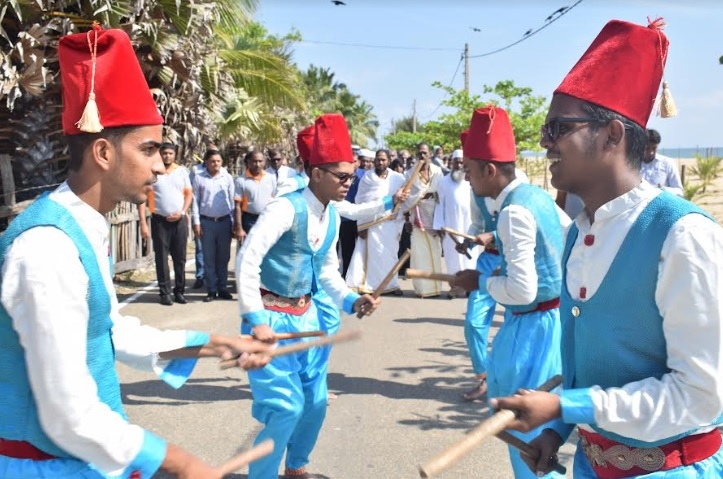A three day exchange visit was organized under NPC’s Action for Religious Coexistence (ARC) project for 114 Local Inter Religious Committees (LIRCs) members in Rakwana, Batticaloa and Addalachchenai to facilitate understanding through experience sharing and interaction.
The visit enhanced the understanding of committee members about each other’s values, opinions and culture and enabled a dialogue on the pluralistic nature of the society while paving the way for a national network connecting LIRCs across the country to make an impact on sustaining religious freedom.
Since communities in the South do not know much about people living in the East, LIRC members from Rakwana were taken to visit sacred places that reflected the culture and religion of Batticaloa and Addalachchenai. The participants explored the history of Buddhism during a visit to a temple.
Chief incumbent Ven. Sri Rathnapala Podidiwela Chandrananda, is committed to strengthening religious freedom in Sri Lanka. He explained the need for sustaining and accepting pluralism. “I participate in Tamil weddings because the Tamil community sees me as a person who belongs to their community. I have supported many people without considering their ethnicity or religion.
Consequently, the different ethnic and religious communities in my area accept me and respect me although we have different religious beliefs. It takes time to heal our souls and to build trust but I believe it is possible to build trust among divided communities,” he said.
During visits to kovils in Batticaloa, participants learnt about the values and religious practices of Hindus and at mosques they experienced the Jummah prayer. They went to an Arabic college to experience the Madrasa school system about which misconceptions emerged after the Easter Sunday attacks. They also went to the Zion church that was bombed and saw the consequences of extremism as well as methods to prevent the recurrence of these incidents.
Participants shared their values and beliefs with members from other committees as well as the challenges and the achievements they have encountered as LIRC members. They discussed the significance of collective efforts in promoting religious freedom.
Rakwana LIRC member A.R.A. Begham said, “As a woman, I believe we can make a greater impact on society but there is no platform for us to contribute. NPC gave us the opportunity to be part of the local reconciliation mechanism. As LIRC members we should sustain religious freedom in our area. That is why these types of initiatives are needed to enhance our understanding of other people’s cultural and religious values. The exchange visit enabled us to learn by exploring different cultures and religions. I am sure it will motivate our team to contribute to sustaining religious coexistence in our society.”
Nalika Damayanthi, a Social Service Officer from Godakawela, said, “I believe practical learning methods such as exposure visits are crucial. This is the first time I was able to make friends from Batticaloa and Ampara. It is great opportunity for us to strengthen the national network of LIRCs. We were able to go inside a mosque, which is a rare opportunity. Visiting the Zion church reminded us to be more empathetic and compassionate towards the grievances of victims of the Easter a Sunday attacks. I realised the importance of our role as community leaders in ensuring peaceful coexistence in our society.”
Rev. T.R. Chelven, a pastor from Rakwana, said, “Rakwana is a multi-religious area where there are controversies over religious conversions. As members of LIRCs, we need to have a better understanding of the root causes that have created conflict situations when deciding initiatives to mitigate them. These types of initiatives will pave the way for enhancing mutual understanding and collaborative engagement in safeguarding religious freedom.”
Kurukkal Sivasiri Eingaran from Rakwana said religious conflicts could be solved through a better understanding of other religions. “We had not visited a mosque before. Learning about other religious practices and beliefs is a great approach to building relations among different communities.”

